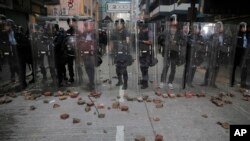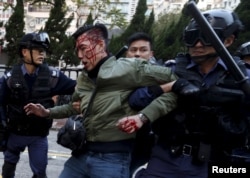Just a week after riots rocked the streets of Hong Kong, in a neighborhood called Mong Kok, the government says it will not launch an independent investigation of the incident.
Thirty scholars and professionals had begun a petition calling for an investigation, which received more than 2,000 signatures.
But a government spokesperson late Monday said there is no need for such an investigation, and described Hong Kong as a transparent and democratic society where “members of the public are entitled to freedom of speech and can express their opinions and aspirations on social problems and government administration” through many channels.
Pro-democracy activist Joseph Cheung said the government’s actions in the aftermath of the protests reveal a continued lack of responsiveness to the concerns of Hong Kong people. “The administration, after the riots, still refused to engage the opposition or the young generation groups,” he said.
The protests broke out during the Chinese New Year holiday, when police tried to clear illegal food stalls. Masked demonstrators hurled bricks and bottles at the policemen, who responded with batons and pepper spray.
One policeman fired two warning shots into the air as the riot continued. About 100 people were injured and 65 were arrested, with 30 charged with rioting.
Beijing’s top official in Hong Kong, Zhang Xiaoming, called the protesters "radical separatists" who "showed terrorist tendencies."
Hong Kong’s Chief Executive CY Leung said the protesters were mostly jobless radicals who represented a small minority of Hong Kong’s population.
Regina Ip, a member of the city's cabinet and chairwoman of the conservative and Beijing-friendly New People's Party, said, “I think the great majority of people know that Hong Kong cannot become independent of China, or even achieve so-called economic autonomy. But it is hardly unfortunate that a small number of young people harbor such ideas, and they are turning their ideas into quite violent actions targeting the police.”
Others in the territory have had a very different reaction.
Benny Tai, a leader of the 2014 Occupy Central movement, said in an open letter Saturday that Hong Kong’s chief executive bears responsibility for the discontent which led to the riots.
Democracy activist Wong said the protests were a predictable result of what he described as the government not hearing or addressing the concerns of average people. “Because the government hasn’t solved the problem way back from the umbrella revolution until now. They don’t solve any of the problems; they just let the problems add up, and that has caused the situation right now,” he said.
Wong expects there will be continued protests in Hong Kong. In 2014, a pro-democracy demonstration blocked city streets for more than two months in reaction to China’s decision to require candidates for chief executive to be vetted by a pro-Beijing panel before being allowed on the ballot.





